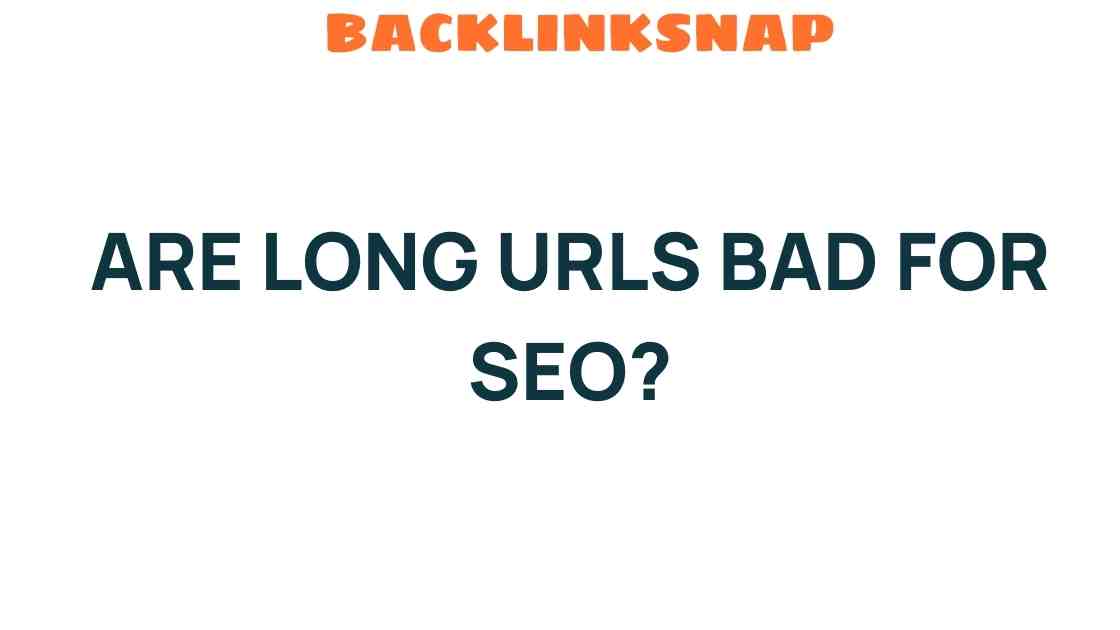Are Long URLs Bad for SEO? Unraveling the Myths and Facts
When it comes to SEO, the structure of your website’s URLs can play a significant role in how your site is perceived by both users and search engines. The debate surrounding long URLs and their impact on search ranking is ongoing. Some argue that long URLs can harm your website optimization efforts, while others believe that the length is less critical than the content itself. In this article, we will delve into the facts and myths surrounding long URLs, their implications for user experience, and how it all ties into effective digital marketing.
Understanding URL Structure
Before we dive into the specifics, it’s essential to have a clear understanding of what constitutes a URL. A URL (Uniform Resource Locator) is the address used to access a resource on the internet. The structure of a URL typically includes the following components:
- Protocol: This denotes how the data is transferred (e.g., HTTP, HTTPS).
- Domain: This is the main web address (e.g., www.example.com).
- Path: This indicates the specific page or resource on the site (e.g., /category/product).
- Query Parameters: These include additional data (e.g., ?id=123&ref=abc).
Long URLs often arise when there are numerous query parameters or when the path is overly descriptive. But does this length have any real effect on SEO?
Myth vs. Fact: The Impact of Long URLs on SEO
One of the common beliefs in the SEO community is that long URLs can negatively impact search rankings. However, this assertion requires a closer examination. Here’s what the evidence suggests:
- Myth: Long URLs are inherently bad for SEO.
- Fact: While shorter URLs are generally easier to read and share, search engines like Google primarily focus on content relevance and quality.
Long URLs can be cumbersome, but they don’t automatically doom a page to poor performance in search results. According to a study by Moz, URL length was not a significant ranking factor. What matters more is that the URL accurately reflects the content it leads to, contains relevant keywords, and is easy for users to understand.
The Role of Keywords in URL Structure
Keyword relevance is crucial in SEO. Including targeted keywords in your URL can provide context to both users and search engines. For instance, a URL like www.example.com/long-urls-bad-for-seo clearly signals to search engines what the page is about, which can aid in ranking for that keyword. Here’s how to optimize your URL structure:
- Keep it descriptive: Use keywords that reflect your content.
- Avoid unnecessary parameters: Limit the use of query parameters that do not add value.
- Use hyphens to separate words: This improves readability for both users and search engines.
By focusing on these elements, you can create URLs that serve both user experience and SEO effectively, even if they are on the longer side.
User Experience and Long URLs
User experience (UX) is a critical aspect of any digital marketing strategy. Long URLs can sometimes lead to confusion. Users may find it difficult to remember or share them, particularly if they are filled with cryptic parameters. Here are some strategies to enhance user experience:
- Simplify where possible: Aim for brevity without losing meaning.
- Utilize URL shorteners: For sharing on social media, consider using tools like Bitly or TinyURL.
- Test your URLs: Analyze user engagement metrics to see if URL length is impacting click-through rates.
Ultimately, while long URLs can be less user-friendly, the content and context they provide are more crucial for both SEO and user experience.
Balancing SEO and User Experience
Finding a balance between SEO requirements and user experience is vital for effective digital marketing. Here are some best practices to consider:
- Prioritize content quality: Ensure that your content is valuable and relevant to your audience.
- Monitor performance: Use tools like Google Analytics to track how URLs perform in search results and user engagement.
- Be consistent: Maintain a consistent URL structure throughout your site for better indexing and user navigation.
Incorporating these strategies can help mitigate any potential drawbacks of long URLs while maximizing their benefits.
Conclusion
In conclusion, while long URLs can pose some challenges in terms of user experience, they are not inherently bad for SEO. The most critical factors for search ranking remain the relevance and quality of the content. By focusing on keyword relevance, creating descriptive URLs, and enhancing user experience, you can optimize your website effectively. Remember, it’s not just about the URL length; it’s about how well your content serves the needs of your audience.
FAQs
- Are long URLs bad for SEO?
No, long URLs are not inherently bad for SEO, but they can impact user experience. - What is the ideal URL length?
There is no strict ideal length, but shorter URLs (under 60 characters) are often preferred for usability. - Should I include keywords in my URLs?
Yes, including relevant keywords can help improve search visibility. - Do query parameters affect SEO?
Excessive or unnecessary query parameters can complicate URLs, but they don’t directly harm SEO. - How can I improve my URL structure?
Use descriptive, concise URLs with relevant keywords and avoid unnecessary parameters. - What tools can I use to track URL performance?
Google Analytics and other SEO tools can help track how URLs perform in search rankings and user engagement.
This article is in the category SEO Optimization and created by BacklinkSnap Team




